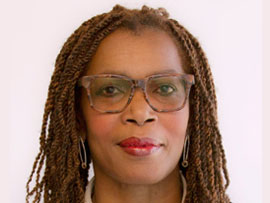Tackling inequalities in mental health
People of African and Caribbean backgrounds, including those who identify as Black British and Mixed heritage, are significantly more likely to be diagnosed with schizophrenia and related psychoses than other ethnic groups in the UK, but the least likely to access psychological care.

Dawn Edge is Professor of Mental Health and Inclusivity in the Faculty of Biology, Medicine and Health. Her work focuses on tackling inequalities in mental health, especially of Black, Asian and other minoritised communities both in the UK and globally.
Her Manchester-based research has led to the development of a low-cost digital alternative to conventional face-to-face therapy for people with mental health disorders, which is currently being evaluated in a national study in the NHS.
Dawn envisions that technology could be harnessed to help level up inequalities in mental health provision between the Global North and South by increasing access to evidence-based care, alongside building workforce capability and capacity to deliver culturally informed psychological therapies.
Psychosis in BAME communities
"What I found really intriguing was that, after decades of research into the inequalities that Black service users and their families experience in accessing mental health services and experiencing poorer care and outcomes, there were no evidence-based interventions to address the needs of these communities," Dawn says.

Professor Dawn Edge
Dawn is a senior lecturer in psychology and mental health and one of the University's academic leads for equality, diversity and inclusion.
To address these disparities, Dawn began organising community mental health conferences in collaboration with NHS mental health trusts, policymakers, voluntary sector and community partners, including faith-based organisations.
From these conferences and focus groups with local African and Caribbean communities, she found that service users, their families and the wider community had three main research priorities: more information about mental health and illness, less reliance on medication, and better access to talking therapies.
"A colleague, Professor Nusrat Hussain, is doing a lot of work in Pakistan, India and increasingly in the Middle East, working with people who are not psychologists but community workers, to train and develop them as practitioners and deploy them to deliver what we might call low-intensity interventions in the UK," Dawn explains.
Although conditions like psychosis are classified as serious mental illnesses (SMI), other common mental health disorders like depression and anxiety actually present a greater global disease burden due to higher prevalence. However, low- and middle-income countries (LMICs) do not have the resources to deliver treatments to address the level of need.
However, using CaFI as a model, we could ensure that therapies are culturally and context appropriate versus exporting interventions developed and trialled in the Global North. Additionally, therapists in more resource-rich countries, like the UK, could deliver therapy with people in LMICs. We could also develop training and supervision models with local people, building workforce capacity explicitly focused on sustainably addressing global mental health inequalities – for example, recruiting and training community mental health workers locally.
The National Institute for Health and Care Excellence (NICE) recommends family intervention as a talking treatment for schizophrenia, other psychoses and related difficulties. However, as Dawn explains, other factors contribute to people from minoritised backgrounds being less likely to receive talking treatments in general, and family therapy in particular.
“We could have therapists in the UK and in North America, for example, delivering therapy anywhere in the world.”
"NICE guidance is that family intervention should be offered to service users 'in regular contact with their families', but what if your family is in another country? Even for people with families, there may be geographical, economic or a myriad of other factors that limit access to family therapy," she says.
Developing a family intervention
Dawn led a team of researchers at the University, which includes service users and members of African and Caribbean communities. Together, they undertook research funded by the National Institute of Health & Care Research (NIHR) to see whether it was possible to develop a Culturally-adapted Family Intervention (CaFI). Their starting point was an evidence-based family therapy for schizophrenia and psychosis that was developed in Manchester.
CaFI was subsequently digitised, creating CaFI:Digital - a low-cost online therapy that can be delivered by professionals trained to work with families in culturally sensitive ways – and, eventually, to increase access to psychological therapy in some of the world's least well-resourced countries.
Between 76% and 85% of people with severe mental health conditions in Global South countries receive no treatment at all. National health budgets in the poorest countries often allocate less than 1% to mental health. It is against this backdrop that Dawn sees CaFI playing a potentially important role.
Building capacity
Dawn and her team are now set to test the feasibility of using digital therapy as a way of helping address the lack of capacity in LMICs, starting in Jamaica.
"We could have therapists in the UK and in North America, for example, delivering therapy anywhere in the world because they no longer have to be in the same room as therapy recipients," she says.
"Delivering family therapy remotely via CaFI:Digital could also improve access for families in rural communities in LMICs where resources are often concentrated in urban centres, making psychological care inaccessible for those with limited capacity to travel.
"By bringing CaFI:Digital into Jamaica initially and working with people like Nusrat to start building up a workforce of community-based practitioners, it could be possible to bridge the gap in accessing specialist mental healthcare.
"Globally, there is such a lack of psychological therapists, particularly clinical psychologists. In response, in the UK there's a whole strategy now for diversifying and increasing the psychological professions to meet increasing need – particularly in conditions like anxiety and depression. In this context, the CaFI model, which was developed in the UK, has potentially global application."
Learn more about the CaFI project.
